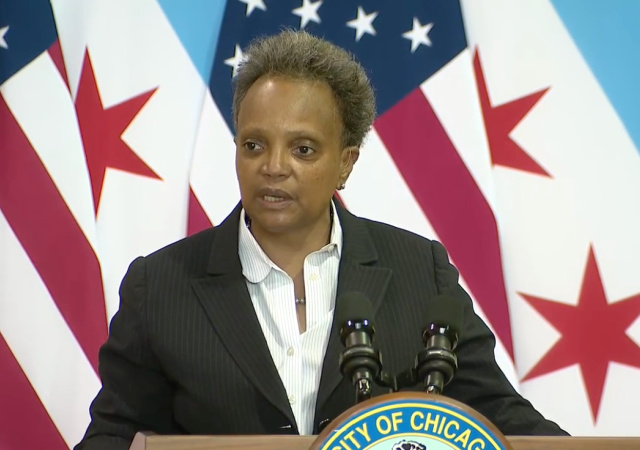Lori Lightfoot Blames Racism for Mayoral Loss But Lost to a Black Guy, Mexican-American Guy

Soon-to-be-former Chicago Mayor Lori Lightfoot played the race and sex card to explain her loss the other day:
“I’m a black woman in America. Of course,” she replied when asked by a reporter if she had been treated unfairly.But she called being Chicago’s mayor “the honor of a lifetime.”“Regardless of tonight’s outcome, we fought the right fights and we put this city on a better path,” Lightfoot said, as she urged her fellow mayors around the US not to fear being bold.Amid heavy criticism for the crime wave, homelessness and other troubles plaguing the city, the mayor had also injected race into the run-up to the election.“I am a black woman — let’s not forget,” Lightfoot, 60, told the New Yorker in a piece that ran Saturday. “Certain folks, frankly, don’t support us in leadership roles.”
Lightfoot came in third. She lost to a black man and a Mexican-American man.
Lightfoot was the first black woman and first openly gay person to be mayor of Chicago. She’s also the first mayor to only serve one term in 40 years.
Everyone thought Lightfoot would be a star. It didn’t take long for her to fall.
Lightfoot made the city worse. Violence and homelessness skyrocketed. She acted like a tyrant during the pandemic. She refused to work with people:
Lightfoot’s transformation from breakout ballot-box star to also-ran centered on three key issues: a dramatic spike in crime during the pandemic, an astonishing array of conflicts with the city’s political and civic communities, and the hellscape of challenges that came with the pandemic and civil unrest.
University of Illinois at Chicago professor emeritus Chris Mooney, told The Chicago Tribune Lightfoot faced problems out of her control like. For instance, “she had to compete for votes with six Black candidates, including some who have been more deeply involved in South and West side communities.”
But most of the problems were in Lightfoot’s control:
“Everyone’s whiplashed on this. The George Floyd (unrest), defund the police — (then) all of a sudden there’s a couple carjackings and people are like, ‘Bring in the white guy,’” Mooney said. “‘This is a very difficult time and difficult to navigate what do we do about police reform. It would be difficult for anybody, and she hasn’t shown the magic touch to figure it out.”Mooney also said Lightfoot hurt herself by being “gratuitously pugnacious.”“We like our Daleys and our Rahms. We complain about them but we say you’ve got to be tough to run the city of Chicago,” Mooney said. “She’s got that but almost in a gratuitous way. She picks fights for reasons unknown to most people.”
Lightfoot is unlikable. If you dared disagree with her or call her out then you’re a racist sexist homophobe:
Veteran political consultant Delmarie Cobb, also speaking before Tuesday’s results were in, noted Lightfoot’s overly defensive approach to criticism, particularly around public safety, where she often scolded white audiences about how they were experiencing crime for the first time.Lightfoot should have focused more on explaining the issues, Cobb said, rather than dismissing as “haters” those who had attacked her over crime.“She’s not taken that tack,” Cobb said. “Instead, it’s, ‘I’m going to force-feed you into acknowledging that I’ve done a good job.’”On a more fundamental level, Cobb said, Lightfoot hasn’t done enough to make herself “into a likable person.”
CLICK HERE FOR FULL VERSION OF THIS STORY